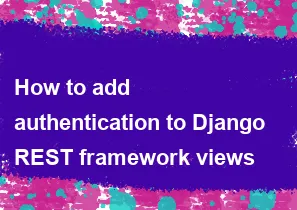How to add authentication to Django REST framework views

Adding authentication to Django REST Framework (DRF) views involves configuring authentication classes in your DRF settings. DRF provides a variety of authentication classes that you can choose from based on your project's requirements. Here's a general guide on how to add authentication to DRF views:
Step 1: Install Django REST Framework
Make sure you have Django and Django REST Framework installed. If not, you can install them using:
bashpip install django djangorestframework
Step 2: Configure Authentication in DRF Settings
In your Django project settings (settings.py), add the following configurations for authentication:
python# settings.py
# ...
INSTALLED_APPS = [
# ...
'rest_framework',
# ...
]
REST_FRAMEWORK = {
'DEFAULT_AUTHENTICATION_CLASSES': (
'rest_framework.authentication.SessionAuthentication', # For session-based authentication
'rest_framework.authentication.TokenAuthentication', # For token-based authentication
# Add other authentication classes as needed
),
'DEFAULT_PERMISSION_CLASSES': (
'rest_framework.permissions.IsAuthenticated',
),
}
In this example, I've included SessionAuthentication for session-based authentication and TokenAuthentication for token-based authentication. You can include or exclude authentication classes based on your project's needs.
Step 3: Apply Authentication to Views
Now, you can apply authentication to your DRF views. You can do this either at the view level or by using the @authentication_classes decorator.
Option 1: Apply at View Level
python# views.py
from rest_framework.views import APIView
from rest_framework.response import Response
from rest_framework.authentication import SessionAuthentication, TokenAuthentication
from rest_framework.permissions import IsAuthenticated
class YourApiView(APIView):
authentication_classes = [SessionAuthentication, TokenAuthentication]
permission_classes = [IsAuthenticated]
def get(self, request):
# Your view logic here
return Response({"message": "Authenticated view"})
Option 2: Apply with Decorator
python# views.py
from rest_framework.views import APIView
from rest_framework.response import Response
from rest_framework.decorators import authentication_classes, permission_classes
from rest_framework.authentication import SessionAuthentication, TokenAuthentication
from rest_framework.permissions import IsAuthenticated
@authentication_classes([SessionAuthentication, TokenAuthentication])
@permission_classes([IsAuthenticated])
class YourApiView(APIView):
def get(self, request):
# Your view logic here
return Response({"message": "Authenticated view"})
Choose the option that fits your project structure and preferences. Make sure to replace YourApiView with the actual name of your DRF view.
After these steps, your DRF views will require authentication based on the configured authentication classes. Users must provide valid credentials (session, token, etc.) to access these views. Adjust the authentication classes and permissions according to your project's security requirements.
-
Popular Post
- How to optimize for Google's About This Result feature for local businesses
- How to implement multi-language support in an Express.js application
- How to handle and optimize for changes in mobile search behavior
- How to handle CORS in a Node.js application
- How to use Vue.js with a UI framework (e.g., Vuetify, Element UI)
- How to configure Laravel Telescope for monitoring and profiling API requests
- How to create a command-line tool using the Commander.js library in Node.js
- How to implement code splitting in a React.js application
- How to use the AWS SDK for Node.js to interact with various AWS services
- How to use the Node.js Stream API for efficient data processing
- How to implement a cookie parser middleware in Node.js
- How to implement WebSockets for real-time communication in React
-
Latest Post
- How to implement a dynamic form with dynamic field styling based on user input in Next.js
- How to create a custom hook for handling user interactions with the browser's device motion in Next.js
- How to create a custom hook for handling user interactions with the browser's battery status in Next.js
- How to implement a dynamic form with dynamic field visibility based on user input in Next.js
- How to implement a dynamic form with real-time collaboration features in Next.js
- How to create a custom hook for handling user interactions with the browser's media devices in Next.js
- How to use the useSWRInfinite hook for paginating data with a custom loading indicator in Next.js
- How to create a custom hook for handling user interactions with the browser's network status in Next.js
- How to create a custom hook for handling user interactions with the browser's location in Next.js
- How to implement a dynamic form with multi-language support in Next.js
- How to create a custom hook for handling user interactions with the browser's ambient light sensor in Next.js
- How to use the useHover hook for creating interactive image zoom effects in Next.js